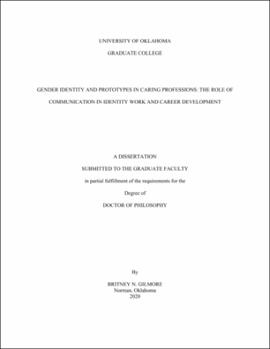| dc.contributor.advisor | Kramer, Michael | |
| dc.contributor.author | Gilmore, Britney | |
| dc.date.accessioned | 2020-07-30T17:03:32Z | |
| dc.date.available | 2020-07-30T17:03:32Z | |
| dc.date.issued | 2020-07-30 | |
| dc.identifier.uri | https://hdl.handle.net/11244/325327 | |
| dc.description.abstract | Occupational segregation is a persistent phenomenon occurring in many professions. In caring professions, the percentage of men in these jobs is low. This interview-based study explains how men in such professions (i.e., social work and elementary education) have navigated their careers and constructed a professional identity. The analysis of 30 interviews with social work professionals and elementary school teachers revealed that participants referenced the occupational prototype to engage in identity work that allowed them to remain in alignment with professional expectations. The prototype for each occupation also determined how men socialized others within caring professions and contributed to their sensemaking process concerning occupational experiences and next steps in their careers. These results are discussed in the context of identity, socialization, and sensemaking literature. | en_US |
| dc.language | en_US | en_US |
| dc.subject | caring professions, identity, gender, sensemaking | en_US |
| dc.title | Gender identity and prototypes in caring professions: The role of communication in identity work and career development | en_US |
| dc.contributor.committeeMember | Bisel, Ryan | |
| dc.contributor.committeeMember | Cionea, Ioana | |
| dc.contributor.committeeMember | Lee, Sun Kyong | |
| dc.contributor.committeeMember | Connelly, Shane | |
| dc.date.manuscript | 2020-07 | |
| dc.thesis.degree | Ph.D. | en_US |
| ou.group | College of Arts and Sciences::Department of Communication | en_US |
| shareok.orcid | https://orcid.org/0000-0003-1670-5315 | en_US |
| shareok.nativefileaccess | restricted | en_US |
